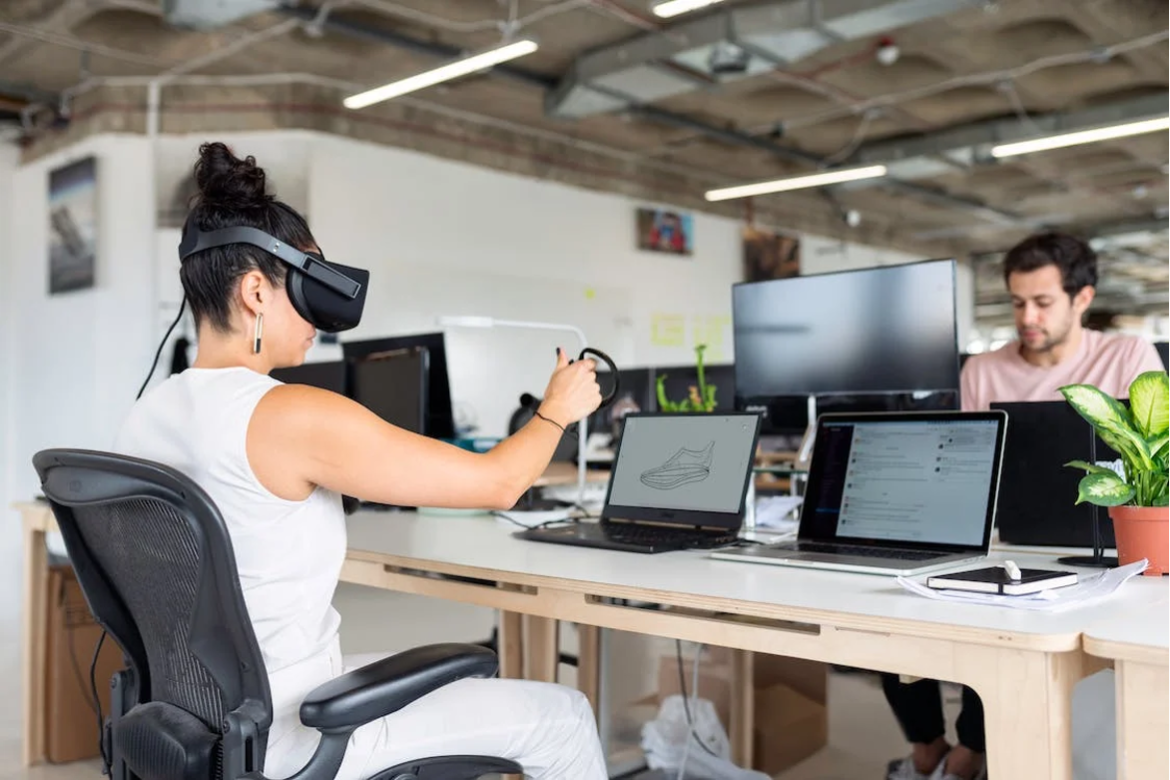Virtual reality (VR) has taken the world by storm, and it’s no surprise that Middle Eastern companies are also making their mark in this rapidly growing field. With its ability to immerse users in a completely different environment, VR technology is revolutionizing various industries such as gaming, education, healthcare, and tourism.
This article will take you on an exciting journey through the top virtual reality companies leading the Middle East, showcasing their innovative solutions and contributions to the global tech landscape.
It’s worth noting that many of these trailblazing firms, such as the best virtual reality company in the UAE, have garnered attention within their region and gained international recognition for their cutting-edge creations.
As we delve into each company’s unique offerings and achievements, you’ll discover how they’re pushing boundaries and redefining what’s possible with VR technology.
So strap on your headset and join us as we explore the fascinating virtual reality world unfolding in the Middle East.
Pioneers In The Gaming Industry
Imagine entering a bustling, neon-lit arcade filled with electronic beeps and excited laughter. You put on a pair of virtual reality (VR) headset that transports you to an entirely different world where you battle mythical creatures or race through futuristic landscapes at breakneck speeds.
This exhilarating experience is not just limited to tech-savvy gamers in Europe, Asia, or North America; it’s rapidly becoming a part of everyday life for millions across the Middle East.
One company leading the way in bringing VR gaming to this region is Anvio VR, based in Dubai. The firm offers players fully immersive experiences using state-of-the-art technology and cutting-edge software. Their flagship location boasts 200 square meters of gaming space, allowing users to physically move around within their chosen virtual environment while interacting with various elements like never before. In addition to catering to individual customers, Anvio VR has expanded its reach by partnering with theme parks and entertainment centers throughout the Middle East.
Another rising star in the Middle Eastern VR scene is Saudi Arabia-based Manga Productions. Focused on creating culturally relevant content for local audiences, they have developed several popular titles such as ‘The Woodcutter’s Treasure,’ which combines traditional Arabic storytelling with interactive gameplay powered by Unreal Engine 4. Through collaborations with educational institutions and government agencies, Manga Productions aims to foster regional talent development and contribute significantly towards building a thriving digital economy within the Kingdom.
As these companies continue pushing boundaries and exploring new frontiers in gaming innovation, one can only anticipate how this exciting medium will soon make waves beyond our wildest dreams – including transforming healthcare practices through virtual reality applications.
Revolutionizing Healthcare With Vr
The Middle East has seen a surge in the adoption of virtual reality technology, particularly in the healthcare sector. Pioneering companies from this region are harnessing VR’s immersive capabilities to bring about significant advancements in medical treatment and patient care. This remarkable progress is enhancing the standard of healthcare and transforming patients’ lives.
Some revolutionary applications of VR in healthcare include:
- Pain Management: Patients suffering from chronic pain can use VR as a non-pharmacological approach to managing their discomfort by engaging in relaxing simulations that distract them from the sensation.
- Rehabilitation: Stroke survivors or those with motor impairments can undergo therapy sessions using customized VR environments, enabling them to practice real-life activities and regain lost functions more effectively than traditional methods.
- Medical Training: By creating realistic simulations of surgeries and other complex procedures, doctors and nurses can hone their skills without risking actual patients’ lives – increasing efficiency while reducing errors.
As we move forward, it becomes increasingly evident that virtual reality will continue playing an integral role in revolutionizing various aspects of healthcare across the Middle East. Physicians have already started embracing this groundbreaking technology to offer innovative treatments for physical and mental health disorders prevailing within the society.
While challenges such as cost, accessibility, and cultural acceptance remain, there is no denying that these technological strides hold immense potential for benefiting countless individuals throughout the region. It won’t be long before these transformative effects extend beyond healthcare into another vital sphere – education – making learning experiences more captivating than ever before, personalized to individual needs, and accessible to learners of all ages and backgrounds, ultimately bridging the gap between traditional and modern educational systems and empowering a generation of well-equipped, innovative thinkers.
Making Education More Engaging
A picture is worth a thousand words, and in the realm of virtual reality (VR) companies in the Middle East, this rings especially true when it comes to transforming education. As technology advances at breakneck speed, VR has become an instrumental tool for educators seeking innovative ways to captivate their students’ attention and boost learning outcomes.
Several leading VR businesses in the region have taken up the mantle of creating immersive educational experiences that transport learners beyond traditional classroom settings. Take Pixelhunters as an example – a Dubai-based company renowned for its groundbreaking work in developing interactive applications and games with strong cultural relevance. Their recent venture into crafting custom-tailored VR solutions for schools demonstrates how melding cutting-edge tech with curriculum-aligned content can make complex subjects more accessible and engaging than ever before.
Similarly, Jordan’s Mawdoo3.com – best known as one of the largest Arabic-language websites globally – entered the ed-tech space by launching its own VR platform called ‘Darsak,’ which offers immersive 360-degree videos covering various academic topics aimed at enhancing users’ understanding.
These initiatives are paving new avenues for growth within the regional tech market and redefining what teaching and learning look like in today’s modern era. By enabling students to experience firsthand environments or historical events they’re studying rather than merely reading about them on paper or via screens, these top-tier Middle Eastern VR enterprises foster deeper connections between learners and subject matter.
With such promising advancements already seeping into classrooms throughout the region, one cannot help but wonder what other industries might similarly benefit from integrating virtual reality technologies — perhaps even those catering to tourists eager to embark on unforgettable journeys through time and space without leaving their armchairs behind?

Enhancing Tourism Experiences
Virtual reality technology is taking the Middle East by storm, and one area where it has made a significant impact is tourism. Numerous companies are now utilizing VR to transform how tourists explore this diverse region, offering immersive experiences that showcase its rich history, architecture, and culture.
As international travel remains uncertain due to the ongoing pandemic, virtual tours provide an accessible way for people worldwide to discover new destinations from their homes. With breathtaking landscapes and centuries-old architectural wonders, the Middle East holds enormous potential for virtual reality in tourism.
Here are some of the most awe-inspiring virtual experiences currently available:
- Petra: Lost City of Stone: This extraordinary tour takes visitors through the ancient city of Petra in Jordan with stunning 360-degree views.
- Dubai’s Underwater Zoo: Dive into Dubai Aquarium’s mesmerizing underwater world without getting wet as you encounter exotic sea creatures up close.
- The Pyramids of Giza: Marvel at Egypt’s iconic pyramids in splendor while learning about their fascinating history through interactive storytelling elements.
As more travelers seek unique and personalized experiences, integrating VR technology into tourism will increasingly become an industry standard. Virtual tours offer a fantastic alternative when physical travel may be limited and serve as enticing previews that can inspire future trips to these captivating locations.
By leveraging innovation and creativity, Middle Eastern countries can enrich their cultural heritage offerings and attract global audiences drawn by unparalleled immersion. This revolution in immersive travel experiences demonstrates just one aspect of what virtual reality can bring to our lives.
The next section will delve deeper into another exciting application – transforming architecture and design processes across industries within the Middle East.
Virtual Reality In Architecture And Design
Delving deeper into virtual reality, we find its extensive applications in architecture and design.
In recent years, architects and designers across the Middle East have embraced VR technology to bring their concepts to life. The ability to visualize a building or space before it is constructed has revolutionized the industry by reducing costs, improving collaboration, and providing clients with an immersive experience that allows them to make informed decisions about their projects.
One noteworthy example comes from Dubai-based company ME Visual, which specializes in utilizing VR for architectural visualization. They’ve worked on several high-profile projects throughout the region, including Nakheel Mall – Palm Jumeirah’s stunning shopping destination – and Bluewaters Island – home to Ain Dubai (The world’s largest observation wheel).
By leveraging cutting-edge VR tools like Unreal Engine 4 and Autodesk 3ds Max, they create hyper-realistic walkthroughs that enable stakeholders to explore every aspect of their proposed designs as if they were physically present.
As this trend continues to gain traction among professionals in the field, more companies are expanding their offerings to cater specifically to those working in architecture and design. This growth highlights the importance of incorporating VR technology and paves the way for further innovations that can enhance these industries even more.
As we look forward to seeing how this transformative tool shapes our built environment moving forward, let us now turn our attention toward another exciting area where virtual reality is making waves: immersive media and entertainment.
Immersive Media And Entertainment
Having delved into the fascinating world of virtual reality in architecture and design, it is time to shift our focus toward another intriguing aspect: immersive media and entertainment. The Middle East has also become a hub for innovation in this domain, with several companies pushing the boundaries of what’s possible using VR technology.
As we dive deeper into this realm, let us explore some key players making waves in the region.
The following are top-tier organizations that have been creating outstanding experiences through immersive media and entertainment:
- 360VUZ:
- A Dubai-based company specializing in live-streaming events and concerts.
- Allows users to attend these occasions while providing an interactive experience virtually.
- Giga Works:
- Established in Saudi Arabia, Giga Works creates custom-made virtual reality content.
- They produce high-quality films targeting various industries, such as tourism, education, and advertising.
These trailblazers have enabled audiences across the globe to access unparalleled experiences from their respective homes’ comfort. Their innovative work allows people to immerse themselves in unique environments without physically being present at those locations. More than just a form of escapism, VR allows individuals to learn about new cultures or places firsthand by simulating close-to-reality situations.
As we look ahead to even more remarkable advancements, one thing remains certain – there is no shortage of creativity when employing virtual reality technologies throughout diverse sectors. With this level of ingenuity constantly driving progress forward, imagine how much potential lies untapped within other fields like training and simulation solutions; let’s delve into that next!
Training And Simulation Solutions
Imagine a world where the lines between reality and the digital realm blur, as if walking through an intricately woven tapestry of immersive experiences.
The Middle East embraces this technological paradigm shift by adopting virtual reality (VR) for training and simulation solutions across various industries, including healthcare, aviation, military, and education.
A prominent example of such applications can be found in Dubai’s Mohammed Bin Rashid Space Centre, which has adopted VR to train astronauts for space missions. This state-of-the-art facility uses advanced VR systems to simulate zero-gravity environments and extravehicular activities that help prepare astronauts for their demanding tasks in space.
Similarly, King Abdulaziz City for Science & Technology (KACST) in Saudi Arabia has invested heavily in creating fully functional human anatomy models using VR technology to improve medical students’ learning experience.
The versatility of these training and simulation solutions paves the way toward a future where professionals are equipped with unparalleled skills honed through realistic experiences delivered via cutting-edge VR technologies. It also opens up new opportunities for innovative startups to develop groundbreaking products tailored specifically to cater to the unique needs of the region’s diverse population.
As we delve deeper into exploring the thriving ecosystem of tech-savvy companies reshaping the landscape with virtual reality, it becomes evident that there is no better time than now to witness how this transformative technology continues to gain momentum within the Middle East market.
Innovative Startups In The Region
Having explored the realm of training and simulation solutions, it’s only fitting that we now dive into the world of innovative startups in the Middle East region. This area is emerging as a hotbed for VR development, with numerous companies pushing boundaries and bringing fresh ideas to life. These startups are not limited to gaming but have expanded their horizons towards healthcare, education, real estate, and other industries.
Among these groundbreaking startups in the Middle East, three particularly stand out:
- VRapeutic: Focused on developing virtual reality applications tailored for individuals with special needs or learning disabilities.
- Autism therapy
- ADHD treatment
- Matter: Revolutionizing how people experience spaces by creating immersive virtual tours through cutting-edge technology.
- Real estate showcases
- Cultural heritage sites
- TakeLeap: Aiming to transform how businesses communicate and engage with their customers using augmented reality (AR) and VR.
- Marketing campaigns
- Employee training programs
These companies exemplify the potential impact of VR technologies across diverse sectors. They are shaping new ways in which professionals can interact with their target audience while providing unique experiences that were previously unattainable.
As we’ve seen throughout this exploration, the Middle Eastern market demonstrates immense promise for embracing advanced technologies such as virtual reality. The expansion of creative startups like those mentioned above will undoubtedly position this region at the forefront of global growth within the industry. Local economies will benefit from increased investment opportunities and job creation driven by technological advancement.
There has never been a more exciting time to be involved in VR innovation across the Middle East.
Conclusion
In conclusion, the Middle East is proving to be a hotbed for innovation and development in the virtual reality sector.
With pioneers in gaming, healthcare, education, tourism, architecture and design, media and entertainment, training, and simulations, we can anticipate an exciting future for VR technology in this region.
As we continue to explore these top companies leading the way, let’s embrace their groundbreaking efforts to revolutionize our lives through immersive experiences that have only just begun to scratch the surface of possibilities.




